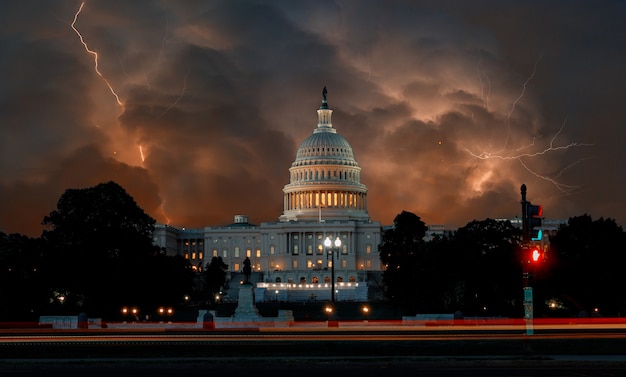Government Shutdown Alert: Impact on US Benefits & Services

A potential government shutdown looms, threatening to disrupt various federal services and benefits across the US, affecting everything from national parks to social security checks.
An alarming prospect is on the horizon: a potential government shutdown. This isn’t just a political event; it’s a situation that could directly impact the lives of millions of Americans, affecting access to essential services and benefits. Let’s delve into what a **government shutdown** means for you and how it could affect your benefits and services.
Understanding a Government Shutdown
A government shutdown occurs when Congress fails to pass appropriation bills or a continuing resolution to fund federal government operations. This leads to a temporary closure of non-essential government agencies and services, impacting various sectors and the public.
What Triggers a Shutdown?
The US government operates on an annual budget approved by Congress. If Congress fails to agree on and pass the necessary funding bills before the start of the new fiscal year (October 1st), a shutdown can occur. This disagreement often stems from partisan politics and differing priorities regarding government spending.
- Failure to pass appropriation bills.
- Inability to enact a continuing resolution.
- Disagreements between the House, Senate, and the President.

During a shutdown, federal agencies must determine which employees and functions are considered “essential” and can continue operating. Non-essential personnel are furloughed, meaning they are temporarily laid off without pay. This can lead to disruptions in various government services, from processing passport applications to conducting safety inspections.
How a Shutdown Impacts Government Services
A government shutdown can have far-reaching consequences for various government services, affecting millions of Americans who rely on them. The severity of the impact depends on the length and scope of the shutdown.
Essential vs. Non-Essential Services
The distinction between essential and non-essential services is crucial during a shutdown. Essential services, such as those related to national security and public safety, typically continue to operate. These include law enforcement, air traffic control, and emergency medical services. Non-essential services, on the other hand, are often suspended, leading to delays and disruptions.
Here are some examples of services that may be affected:
- National Parks: Many national parks and monuments close, impacting tourism and recreation.
- Passport and Visa Processing: Delays in processing passport and visa applications can affect travel plans.
- Government Agencies: Agencies like the IRS and Social Security Administration may reduce services, leading to longer wait times.
The ripple effects of these disruptions can be significant, affecting both individuals and the economy. For example, the closure of national parks can negatively impact local businesses that rely on tourism.
Potential Impact on Federal Employee Benefits
A government shutdown can significantly impact federal employees and their benefits, creating uncertainty and financial strain. Understanding these potential effects is crucial for federal workers and their families.
Furloughs and Pay
One of the most immediate impacts of a shutdown is the potential for furloughs. Non-essential federal employees are temporarily laid off without pay, leading to a loss of income. While Congress has often approved back pay for furloughed employees after past shutdowns, this is not guaranteed.
The financial impact of a furlough can be substantial, particularly for employees who live paycheck to paycheck. Even with back pay, the delay in receiving income can disrupt household budgets and financial planning.
Health Insurance and Retirement
During a shutdown, federal employees typically maintain their health insurance coverage, although there may be delays in processing claims or changes. However, the long-term effects of a shutdown on retirement contributions and benefits can be more complex. Furloughed employees may miss out on contributions to their retirement accounts, potentially impacting their long-term savings.

Federal employees should contact their human resources departments to understand the specific impacts of a shutdown on their health insurance and retirement benefits.
Social Security, Medicare, and Other Entitlements
Many Americans rely on Social Security, Medicare, and other entitlement programs for their financial security and healthcare. A government shutdown can raise concerns about the continuity of these benefits.
Social Security and Medicare
Social Security and Medicare are generally considered essential services and are expected to continue operating during a government shutdown. However, there may be delays in processing new applications, resolving disputes, or providing customer service. The Social Security Administration and Medicare may operate with reduced staff, leading to longer wait times and potential disruptions.
While benefit payments are typically not affected, beneficiaries should be aware of potential delays in other services, such as obtaining replacement Social Security cards or resolving Medicare billing issues.
SNAP and Other Assistance Programs
The impact of a government shutdown on programs like the Supplemental Nutrition Assistance Program (SNAP) and Temporary Assistance for Needy Families (TANF) can vary. Funding for these programs is often determined on a state-by-state basis, and the availability of benefits may depend on the specific circumstances of each state.
Some states may have sufficient funding to continue providing SNAP benefits during a short-term shutdown, while others may experience disruptions. It is essential for recipients to stay informed about the status of these programs in their state.
Defense and Veterans Affairs
The Department of Defense and Veterans Affairs provide critical services to the US military, veterans, and their families. A government shutdown can impact these services in various ways.
Military Operations
Active-duty military personnel are typically required to continue their duties during a government shutdown, although they may face delays in pay. Civilian employees of the Department of Defense, however, may be subject to furloughs, potentially impacting support services and administrative functions. Essential military operations and national security functions are generally maintained.
The impact on military readiness and training can be a concern during a prolonged shutdown.
Veterans Benefits and Healthcare
Veterans benefits, including disability payments and pensions, are generally expected to continue during a government shutdown. However, there may be delays in processing new claims or providing certain healthcare services. VA hospitals and clinics typically remain open, but some non-essential services may be reduced or suspended.
Veterans should stay informed about any potential disruptions in services and contact the VA for assistance if needed.
Preparing for a Potential Government Shutdown
Given the uncertainty surrounding a potential government shutdown, it is essential to take steps to prepare and mitigate the potential impact on your finances and access to services.
Financial Planning
Assess your financial situation and identify areas where you can reduce spending or build a financial cushion. Consider setting aside emergency funds to cover essential expenses in case of disruptions to income or benefits. Review your budget and prioritize needs over wants.
Explore options for obtaining temporary financial assistance if needed, such as credit lines or emergency loans.
Staying Informed
Stay informed about the status of the government shutdown and its potential impact on your benefits and services. Follow news reports, government websites, and social media accounts for updates. Contact your elected officials to express your concerns and urge them to resolve the budget impasse.
| Key Point | Brief Description |
|---|---|
| ⚠️ Shutdown Trigger | Failure to pass budget bills by October 1st. |
| 👨💼 Federal Employees | Potential furloughs and uncertainty about pay. |
| 🏛️ Social Security | Payments continue, but some services may be delayed. |
| 🏞️ National Parks | Potential closures affecting tourism and access. |
Frequently Asked Questions
▼
A government shutdown occurs when Congress fails to pass funding bills. Non-essential services are suspended, and many federal employees are furloughed until funding is restored.
▼
Yes, Social Security benefits are generally expected to continue during a government shutdown, as they are considered essential services. However, expect potential delays.
▼
Typically, yes. National parks often close during a government shutdown, impacting tourism and recreational activities, unless specific funding arrangements are in place.
▼
Federal employees deemed non-essential may face furloughs, meaning temporary unpaid leave. Essential employees continue working, though they might face delayed paychecks.
▼
Reliable sources include official government websites for specific agencies, major news outlets, and updates from your elected officials. Check official government social media for announcements.
Conclusion
A potential government shutdown poses a significant threat to the stability of benefits and services across the US. Understanding the impacts, preparing financially, and staying informed are crucial steps to navigate these uncertain times. By taking proactive measures, individuals and families can mitigate the potential disruptions and ensure their well-being.






